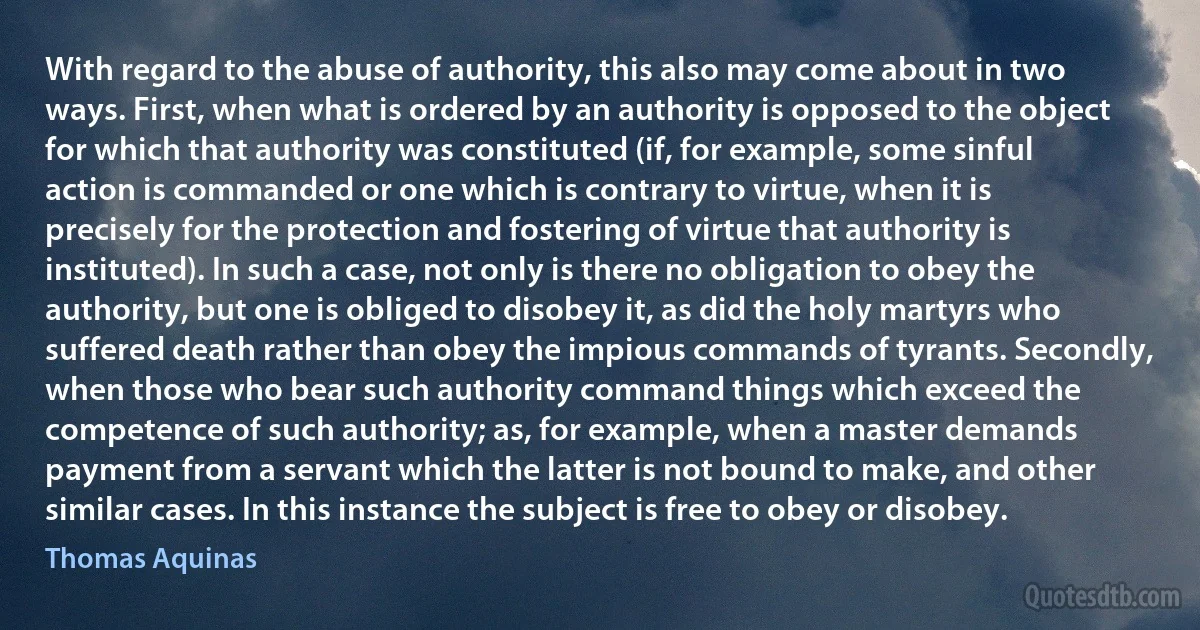
With regard to the abuse of authority, this also may come about in two ways. First, when what is ordered by an authority is opposed to the object for which that authority was constituted (if, for example, some sinful action is commanded or one which is contrary to virtue, when it is precisely for the protection and fostering of virtue that authority is instituted). In such a case, not only is there no obligation to obey the authority, but one is obliged to disobey it, as did the holy martyrs who suffered death rather than obey the impious commands of tyrants. Secondly, when those who bear such authority command things which exceed the competence of such authority; as, for example, when a master demands payment from a servant which the latter is not bound to make, and other similar cases. In this instance the subject is free to obey or disobey.
Thomas AquinasRelated topics
abuse action authority bear bound case command death example fostering free holy instance master payment servant virtue things waysRelated quotes
Though acts of reception and of understanding are in some measure fictions of ordered intuition, myths of reason, this truth does not justify the denial of intentional conduct. It is as absurd to discard as mendacious, as anarchically opaque, the bearing of contextual probability and suggestion, as it is to invest in such probability any blind trust. The negations of post-structuralism and of certain varieties of deconstruction are precisely as dogmatic, as political as were the positivist equations of archival historicism. The "emptiness of meaning" postulate is no less a priori, no less a case of despotic reductionism than were, say, the axioms of economic and psycho-sociological causality in regard to the generation of meaning in literature and the arts in turn-of-the-century pragmatism and scientism.

George Steiner
All the virtues which appeared in Christ shone brightest in the close of His life, under the trials He then met. Eminent virtue always shows brightest in the fire. Pure gold shows its purity chiefly in the furnace. It was chiefly under those trials which Christ endured in the close of His life, that His love to God, His honor of God's majesty, His regard to the honor of His law, His spirit of obedience, His humility, contempt of the world, His patience, meekness, and spirit of forgiveness towards men, appeared. Indeed, every thing that Christ did to work out redemption for us appears mainly in the close of His life. Here mainly is His satisfaction for sin, and here chiefly is His merit of eternal life for sinners, and here chiefly appears the brightness of His example which He has set us for imitation.

Jonathan Edwards (theologian)
It should be never absent from our recollection that there are now two distinct nations in China--the Chinese and the Tartars--whose characters essentially differ, notwithstanding their external appearance be nearly the same. They are both subject to the most absolute authority that can be vested in a Prince(Qianlong), but with this distinction--that to the Chinese it is a foreign tyranny, to the Tartar a domestic despotism. The latter consider themselves as in some degree partakers of their Sovereign's dominions over the former, and that imagination may, perhaps, somewhat console them under the pressure of his power upon themselves--like the house servants and house negroes belonging to a great landlord in Livonia or planter in Jamaica, who, though serfs themselves, look down upon the peasantry and field negroes as much their inferiors.

George Macartney
The infinite... happens to subsist in a way contrary to what is asserted by others: for the infinite is not that beyond which there is nothing, but it is that of which there is always something beyond. ...But that pertaining to which there is nothing beyond is perfect and whole. ...that of which nothing is absent pertaining to the parts ...the whole is that pertaining to which there is nothing beyond. But that pertaining to which something external is absent, that is not all ...But nothing is perfect which has not an end; and the end is a bound. On this account... Parmenides spoke better than Melissus: for the latter says that the infinite is a whole; but the former, that the whole is finite, and equally balanced from the middle: for to conjoin the infinite with the universe and the whole, is not to connect line with line.

Aristotle
What is a public meeting? It is not an anarchical combination-it is not a mob-it is an assemblage of rational beings to which, if the invitation be general, every man has a right to go, and the Government reporter has a right to go, but only like others and subject to the ordinary law. But if instead of appealing to the promoters of the meeting...to afford the Government reporter facilities, if instead of that the method of violence is resorted to, then I say the law was broken by the agents of the law. It is idle to speak to the Irish people of the duty of obeying the law, or to bring in Coercion Bills to make them obey the law, if the very Government that so speaks and that brings in these Bills has agents who violate the law by violently breaking up orderly public meetings, and who are sustained by the Ministers of the Crown in this illegal action.

William Ewart Gladstone
